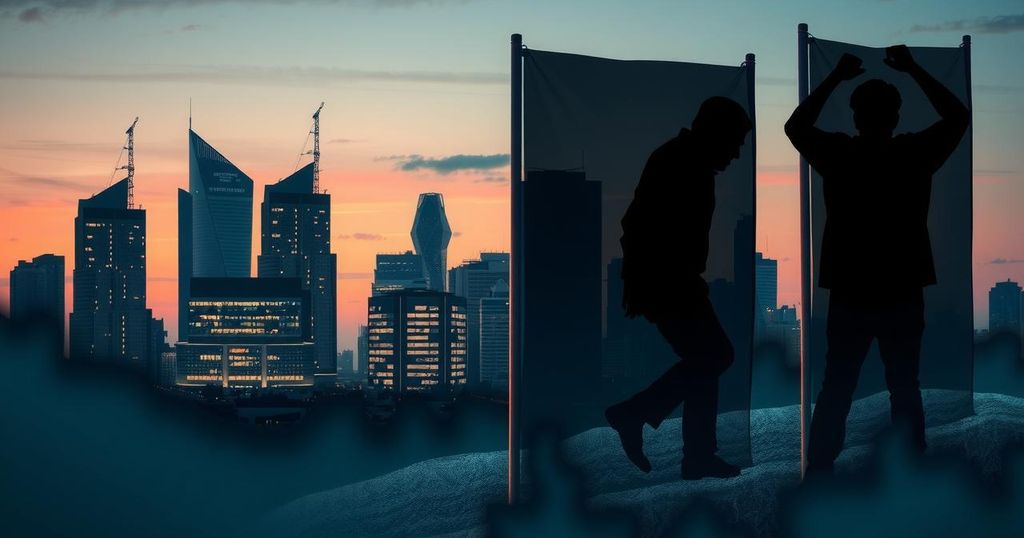Rwanda-backed rebels have entered Bukavu, eastern Congo’s second-largest city, encountering minimal resistance from government forces. Many residents cheered the M23 rebels as they expanded their control following their capture of Goma. The conflict, which has led to significant displacement and humanitarian crises, reflects deeper ethnic tensions and political aspirations by the M23. President Tshisekedi met to discuss security measures while regional responses remain hesitant amid calls for ceasefire and dialogue.
On Sunday morning, Rwanda-backed rebels have reached the center of Bukavu, the second-largest city in eastern Congo, largely without opposition from government forces. This marks a notable expansion in the rebels’ activities during their ongoing conflict in the region. Residents were observed cheering for the M23 rebels after their arrival from Goma, approximately 63 miles away, which they recently captured. However, many areas of Bukavu were deserted as residents chose to stay indoors.
The M23 rebels are a major armed group among over one hundred others vying for control over Congo’s mineral-rich eastern region. UN estimates suggest that the group is supported by around 4,000 troops from Rwanda, contributing to a humanitarian crisis that has displaced over six million individuals. Notably, approximately 350,000 people became homeless after the rebels advanced into Goma.
It remains uncertain whether the M23 has fully taken control of Bukavu, although they are stationed at significant locations, including the South Kivu administrative office. Onlookers did not report any fighting or the presence of Congolese forces in most parts of the city. Blaise Byamungu, a resident, criticized the government, remarking that it appeared “abandoned by all the authorities and without any loyalist force.”
In contrast to previous events in 2012, during which M23 seized Goma due to ethnic tensions, analysts suggest that the rebels are now pursuing political power. Many Congolese soldiers and civilians fled in the face of the rebel advance, accompanied by incidents of looting and widespread panic.
Following reports of the situation, President Felix Tshisekedi held a security meeting in Kinshasa, asserting that Bukavu was briefly invaded by M23 but remains under Congolese military control. Alongside local militia allies, the Congolese forces are undergoing support from troops from Burundi and South Africa to maintain order in Bukavu.
Burundi’s President Evariste Ndayishimiye has indicated a lack of intention to retaliate against the recent fighting, warning against those looking to exploit the situation. The African Union summit in Ethiopia ranked the conflict’s resolution as a top priority, emphasizing the need for respect for Congo’s sovereignty as echoed by UN Secretary General António Guterres.
Despite the urgent situation, African leaders and the international community have exhibited hesitation to take decisive action against the M23 or Rwanda, advocating instead for a ceasefire and dialogues. The Congo River Alliance, which includes M23, professed its commitment to “defending the people of Bukavu,” encouraging residents to remain calm amidst turmoil.
The ongoing conflict in Congo is intertwined with historical ethnic disputes. The M23 rebel group claims it aims to protect ethnic Tutsis while Rwanda argues that these individuals are under threat from Hutus and former militias responsible for the 1994 Rwandan genocide. Many Hutus, subsequently displaced, migrated to Congo and integrated into the Democratic Forces for the Liberation of Rwanda militia, which Rwanda asserts is linked to the Congolese military.
The recent advances of Rwanda-backed M23 rebels into Bukavu exemplify a significant escalation in their operations within eastern Congo, where they face little resistance from government forces. This move not only raises concerns about the control of the city but also highlights the ongoing humanitarian crisis affecting millions in the region. The complex interplay of ethnic tensions and regional dynamics continues to influence the conflict, suggesting the need for a strategic and collaborative response from both the international community and regional leaders.
Original Source: jamaica-gleaner.com






